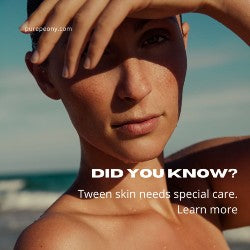
Tween skincare - is it just a craze or do they really need it?
Share
Tweens are going wild for skincare. Viral TikTok trends, YouTube, social influencers...it might seem like its everywhere! Do your kids need all this stuff? Well skincare is important for tweens but elaborate skincare routines can be more harmful than helpful.
Keep it simple
Greenlight recommends "avoiding the more complex or targeted skincare products many adults use. That’s because tween and teen skin is still developing and their hormones produce a different skin environment than adults. The more you introduce, the more reactive the skin can be. Layering too many ingredients on young skin can have the opposite effect - some kids might develop sensitivities in reaction to those ingredients that can perpetuate down the line."
Dermatologists agree less is more with skin - especially young skin. Start with these three basic skincare steps for tweens and teens:
1. Cleansing
Cleansing is the first and most important step of any healthy skin care routine. Use a gentle face cleanser twice a day, in the morning and at night, to remove dirt and excess oil.
2. Moisturizing
Moisturizing is crucial to maintain healthy skin. Developing kids need to keep it simple. Choose a lightweight, non-comedogenic moisturizer that won't clog pores. Have your tween apply it after cleansing to keep their skin hydrated.
3. Sun protection
Sunscreen with at least SPF 30 is a must, even during your tween years. Apply it daily in the morning and again later if they’re active outside.
Avoid
-
Harsh chemicals - stick to natural ingredients.
-
Retinols: Save anti-aging creams for later in life.
-
Harsh or too-frequent exfoliators: Be cautious with harsh exfoliators as excessive use can damage your skin and cause irritation.
-
Multi-step routines or products: Keep it simple with a few essential products and fewer ingredients.
-
Trends: Remind your tween they don’t need to follow every skincare trend.
Again, Greenlight says "Using too many or the wrong products can age young skin prematurely and lead to redness, breakouts, and irritation. Exactly what your child is trying to avoid!"
